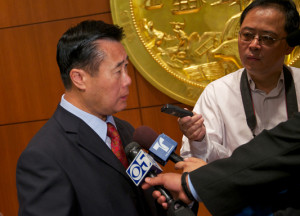
State Sen. Leland Yee (D-San Francisco) recently reintroduced a bill into the state senate that will prohibit executive pay raises in the California State University and University of California systems during years where there is a positive vote to increase student fees.
In immediate response to the approved tuition increase for the upcoming Fall Quarter, Yee’s bill seeks to address the controversy associated with high compensation for public college administrators.
This year California cut state funding from each university system by $650 million. In response, the CSU Board of Trustees approved a 12 percent increase in addition to a previously approved 10 percent increase.
The CSU Board of Trustees, responsible for raising tuition a total of 22 percent, is also responsible for awarding the new president of San Diego State University a $400,000 salary—$100,000 more than his predecessor.
The UC Board of Regents voted on similar matters that resulted in a 10 percent tuition increase, accompanied by a decision to raise compensation for three top administrators. For example, UC San Francisco Medical Center CEO Mark Laret will receive a $195,000 annual pay hike, bringing his annual salary to $935,000.
“The action taken last week by the regents and trustees is appalling and reinforces the perception that they are completely out of touch,” said Yee at a recent press conference. “UC and CSU are public institutions, not Wall Street banks. Once and for all, it is time to stop these egregious compensation practices and restore the public trust.”
Yee, who has continually voiced his contempt towards state budget cuts to education, has been persistent in his efforts to reform the system.
In March 2009, the Democratic senator introduced SB-217, the initial bill that ventured to ban executive pay raises in California’s public universities during bad budget years.
Then Gov. Arnold Schwarzenegger vetoed the bill under the assertion that flexible pay was necessary in the CSU and UC systems to attract talent and compete with private institutions.
Schwarzenegger’s presumption is still felt amongst executives in the CSU and UC systems.
Bradley Wells, interim vice president of administration and finance at CSU East Bay ,feels that “declining support from the state for public higher education in California requires that we attract highly qualified higher education leaders.”
“Restricting the pay of senior executives will do little to help reestablish the position of the CSU and UC as the model for public higher education systems in the United States,” said Wells. “Presently, senior executives in the CSU system are underpaid relative to our peers and these regulations will further impair our ability to compete.”
A 2010 study conducted by Mercer Consulting showed that in comparison to 15 public universities across the United States, CSU presidents have salaries that are 26 percent lower than other university systems.
Still, momentum continues to build to set a limit on executive salaries in California’s public university systems.
Yee is not alone in his efforts to ban executive pay hikes. State Sen. Elaine Alquist (D-Santa Clara) and Sen. Ted Lieu (D-Torrance) introduced similar legislation that aim for nearly identical results.
Students in California’s public university systems say they feel targeted by fee increases and believe Yee’s bill will place students and executives on equal playing ground.
“This bill is a must,” said Frank Quintana, CSUEB Associated Student Inc. director of legislative affairs. “It’s a positive step to actually representing students.”
Gov. Jerry Brown has not taken a position on the legislation, but frowned upon the CSU Board of Trustee’s decision to award the new president of SDSU $100,000 more than his predecessor.
“Time and time again, rather than protecting the needs of students and California families, the Regents and Trustees line the pockets of their top executives,” said Yee. “While these public administrators are living high on the hog, many Californians are struggling. We deserve better.”








